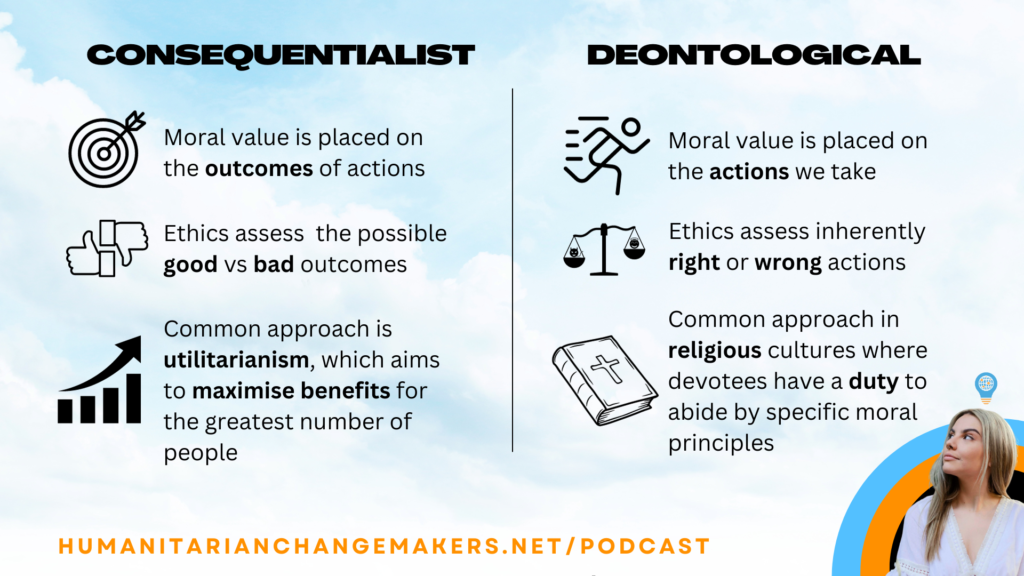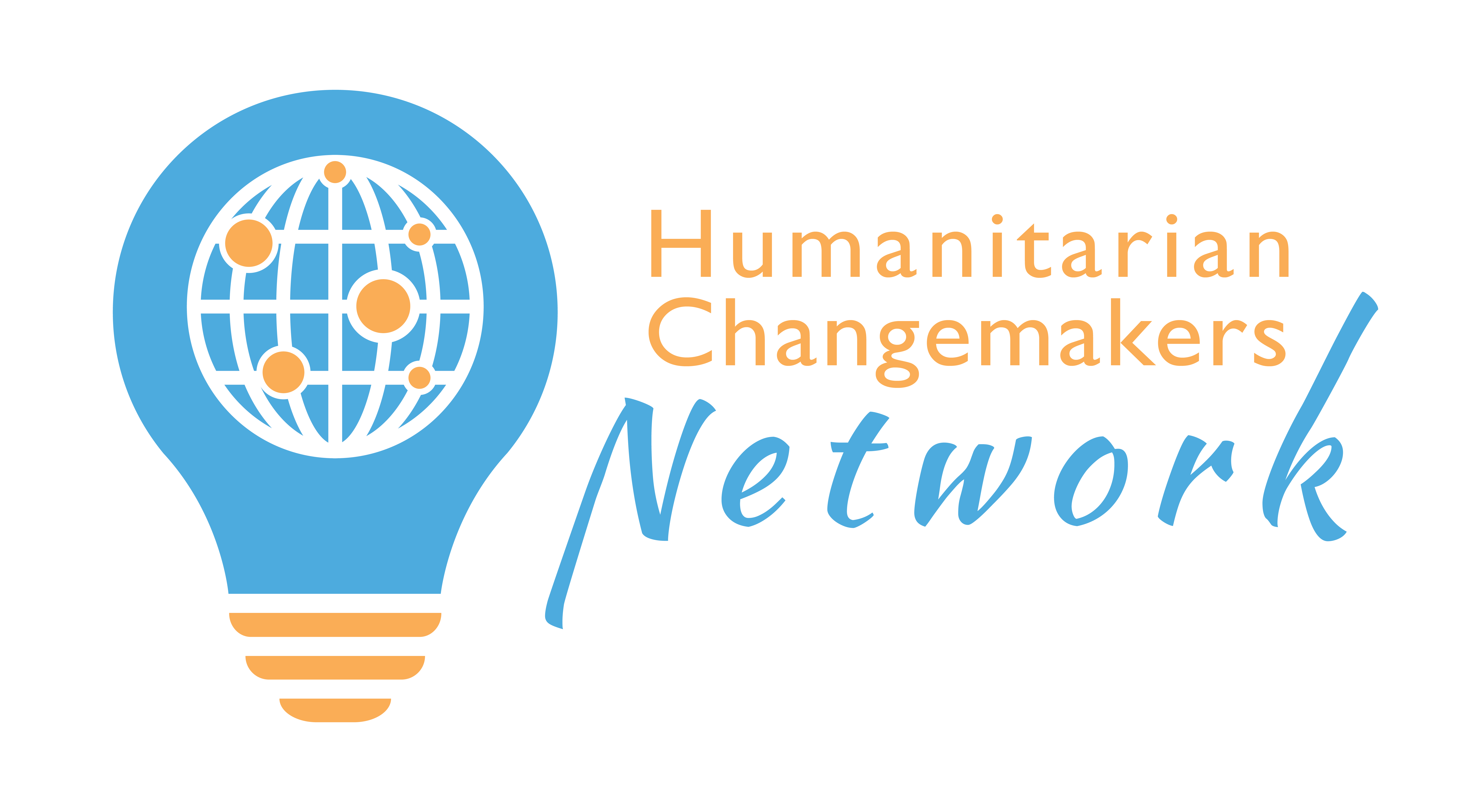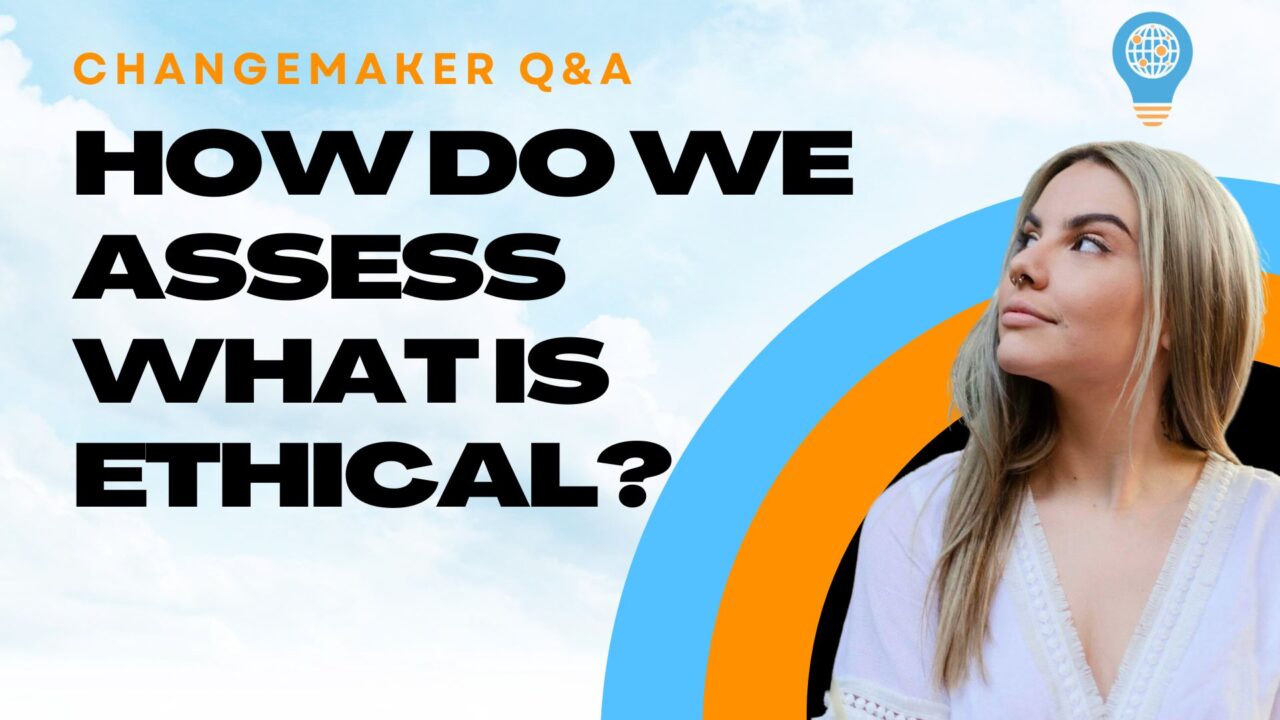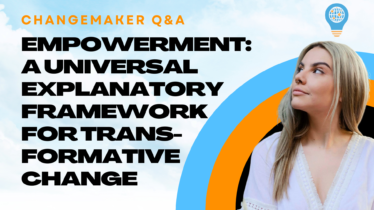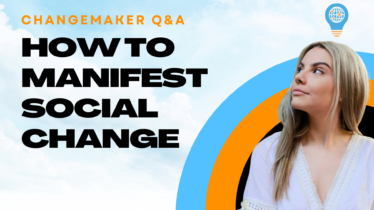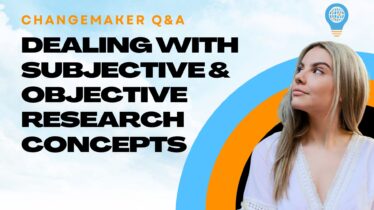Welcome back to Changemaker Q&A. I am your host Tiyana J, I am the founder of the Humanitarian Changemakers Network and a final year PhD student and I am very excited to be answering today’s question because this topic is one that I am super passionate about. We’re going to be discussing ethics and how we deal with ethical dilemmas.
And the reason I am so excited to answer this is because I actually have a background in philosophy, even though I am doing my PhD in comms and sociology, I actually studied philosophy and majored in philosophy. During my undergrad degrees, and I actually did my honors in philosophy. So it was my philosophy honors that got me into the PhD that I’m doing.
And even though I’m not actually in the philosophy discipline anymore, I. do take a very philosophical approach to my research. I have a very strong focus on ontology and epistemology in my research through the critical realist philosophical paradigm that I research in. Now, today’s question was asked by Courtney and The question is, Whether or not something is ethical tends to be quite subjective.
We hear a lot about ethical consumption or ethical investing, but how should we assess whether something is ethical? So, thank you for your question Courtney, I’m super keen to jump into this one. If you guys listening have a question that you want answered, Definitely feel free to head to our website, humanitarian changemakers.
net forward slash podcast to ask us your question, or if you are watching on YouTube or Spotify, you can directly ask your question on either of those platforms. We will send Courtney and anybody else whose question gets answered on the pod, some changemaker code goodies as a thank you for asking your question.
Now, this idea of whether or not something is ethical is very important and it’s becoming more and more, I guess, prominent in discussions across the social change space. In the same way, I think the idea of sustainability is becoming more popular just in general discourse. Now, when we talk about something being ethical, what we’re really talking about here is Whether or not it is morally good or morally right, as opposed to something being morally bad or morally wrong.
So I’m going to unpack this question that Courtney asked us through the kind of three key branches of moral philosophy. And I want to begin by just looking at it from the perspective of meta ethics for a minute, because there is a little bit of an underlying assumption. here in the question that Courtney asked us.
And this is not a criticism. This is just something that I think we need to be kind of aware of and need to unpack. Now, metaethics is essentially the branch of moral philosophy that deals with the nature, the meaning, or the justification, of of morality and ethical concepts and terms. So it’s really that kind of like fundamental stuff.
If you could think of like those most fundamental moral questions, like what is morality? That is a meta ethical question. Now in Courtney’s question, she said whether or not something is ethical tends to be quite subjective. I think that is an important observation because generally when we are looking at Different ethical dilemmas in our day to day life, the potential outcomes or the actions that we might take do tend to be a little bit subjective in which, in determining which is the best approach.
Now, it’s important to note that morality and ethics isn’t necessarily, uh, an inherently subjective concept or phenomenon. And there are some philosophers that believe it should be approached from an objective perspective and there are others that believe it should be approached from a subjective perspective.
So this idea of ethics being subjective is what moral philosophers call moral relativism. And it essentially holds that ethical views or principles are subjective and they’re going to vary from one individual to another. Or from one culture to another. So in this view, what is morally right or wrong or good or bad is going to depend on the individual’s beliefs or the cultural norms and values that are held by the collective society.
So in moral relativism, there are no universal moral truths. And You know, I think we can see this in a lot of the issues that we’re dealing with when there aren’t necessarily kind of universally agreed upon sets of moral principles or ethical codes. When we’re dealing with potentially controversial issues things like abortion, for example, uh, you can kind of see that there are different views that are held by people from different backgrounds or different societies.
And I think it’s important to recognize the importance of having diverse moral beliefs across different cultures, and it’s important that we kind of develop some sort of like moral tolerance and this idea that we should promote respect for diverse moral viewpoints or diverse cultural norms and practices, regardless of whether or not we actually agree with them or not.
I think that we can kind of hold both of those at the same time. We can look at something and say, you know what, I don’t agree with this. But, I respect that you as an individual or you as a different culture might think differently on this. And, like I mentioned, we can see that different societies around the world often hold different views on whether certain things are morally right or wrong.
And so, we tend to navigate the world assuming that there is an absence of certain moral truths. And this viewpoint then contrasts with the more objective view of moral realism. Now, moral realism asserts that there are moral facts that exist independently of our individual or collective beliefs of those facts.
And ethical truths exist objectively and they can be discovered through rational or logical inquiry. Thank Now, in this view it’s generally taken that there are certain moral principles that we can apply universally and they should be morally binding for all rational beings. Now, one of the, I guess, benefits of this viewpoint is that there is a strong appeal to reason.
The… is strong arguments behind a lot of these moral principles, and it’s not just dependent on an individual’s beliefs or emotions. So, generally, they are a lot easier to argue. And there are some really common examples of this, the most common, I think, being human rights. And the idea of the Universal Declaration of Human Rights is an example of a type of universal moral truth or moral realism that’s kind of grounded in natural law theory.
Natural law theory is an approach that kind of argues that there is a natural order or there are natural laws that govern the world or govern morality or govern societies. And these are generally justified and rooted in The nature of what it means to be human around the world. So things like the Universal Declaration of Human Rights and the very idea of human rights brings us some kind of moral universality where we have these common moral values and principles that transcend our cultural norms and our borders.
And they suggest that there is some kind of objective basis for ethics and what is morally right or wrong, good or bad. I think this notion of societal or moral progress is also dependent on the existence of some kind of moral truths. We look back at our history and we think, okay, well, you know, we’ve come such a long way morally, the things that we consider to be right or wrong now.
Much more progressive than what they used to be. And for that argument to hold up, then there’s an assumption that there is some kind of objective standard that we can measure those improvements against that being today’s standard. So I think that. It’s just important to be aware of these two different approaches.
My personal take on moral relativism and moral realism, and this is just my own personal take that I apply in, I guess, my own worldview and my understanding of the world and also my work, is that there are universal moral truths that do pertain to the flourishing of Humanity as a collective and individual humans, but the way in which these universal moral truths might actually be actualized is very context dependent.
So just to illustrate that, for example, I do very strongly believe in the justification of human rights and the universal declaration of human rights. I do think that there are Objective, universal truths and rights that apply to all people around the world, but the way in which we might realize these human rights is going to be context dependent.
And I hold that view, firstly, for just the purpose of practicality, I think that, you know, we can’t expect if we take maybe the 25th article of the Universal Declaration of the Human Rights, I think it’s the 25th, it’s that we have a right to a particular standard of living, to an education, access to health care, all of those things.
That is a… Right? That all humans hold. But what that standard of living actually looks like depends on your external circumstances and the context in which you find yourself. The standard of living that I am used to living here in Brisbane is probably different to the standard of living that my father grew up with in Serbia or the former Yugoslavia.
So, neither of those are a better or worse standard of living. I think they make sense for the context in which the people find themselves. And as long as it is allowing people to flourish, then it’s achieving its aims. So, that is kind of my personal view. I also think that this idea that… The actualization of particular rights or moral truths is context dependent also means that there is room for us to introduce maybe more kind of subjective, uh, ethical views.
So… If you have a particular view based on maybe your religious background or your social norms or your cultural upbringing about what constitutes a good education, I think that you should be allowed to pursue that type of education, whether that is through a non profit. Conventional schooling system, education system, or an alternative.
I think that people have a right to that, as long as that particular education that these people are receiving still meets the kind of baseline standard that is set out in the Universal Declaration of Human Rights. So that’s my own personal viewpoint. But like I said, philosophers have been arguing and debating this concept in, uh, moral philosophy for a very long time.
So it’s a good idea to just be aware that there are differing viewpoints and You know, none of them are inherently better or worse than the other. And it’s also a good thing to consider that when you might be having a moral debate or an ethical discussion with somebody that they might hold the opposing view.
on whether ethics are objective or subjective. And I always think that it’s a really good idea to be able to I guess, adjust your argument to either of those approaches. I think that the strongest cases for what is ethically right or wrong is the one that appeals to both. So when it comes to assessing ethics and whether something is ethical, We have principles and norms and different frameworks that we can use, and these essentially provide a lens through which we can assess the situation.
And now we’re entering the kind of second branch of moral philosophy. Personally, this is my favorite and this is normative ethics. Normative ethics is sometimes referred to as more prescriptive ethics and it is concerned with Providing frameworks for evaluating the moral quality of actions or the outcomes of our actions, and determining what is right and wrong or good and bad.
And it aims to essentially establish some kind of ethical principles or rules or norms that can govern and guide human behavior. So. This is really my gem. This is the branch of philosophy that kind of was like my gateway into philosophy from a particular Australian normative ethicist that I read in high school and I will talk about him very shortly.
So, When it comes to normative ethics, there are two main frameworks that I want to kind of compare and contrast that we might use when we are assessing ethical dilemmas in the context of social change. So the first is consequentialism. Consequentialism is… an approach that judges the morality of actions based on their outcomes or their consequences.
So the most common or probably most well known approach to consequentialism would be utilitarianism. So, utilitarianism is a consequentialist approach, so, because it’s consequentialist, we’re judging what is good or bad, and we’re putting moral value on the outcomes of an action. And it looks at utility.
Utility, most often, is defined as the principle of the greatest good for the greatest number of people. So, you could substitute utility for something like happiness. or well being, uh, and there are different ways you could kind of I guess measure utility. But that’s what a utilitarian approach is.
So to take a utilitarian approach, it involves weighing up the pros and cons a lot of the time. And One of the best examples for utilitarianism is the one that kind of got me into philosophy. So, this is essentially the argument that is put forth in Peter Singer’s book, The Life You Can Save. I read this book in high school, I think I was grade 11 or 12.
My friend Qui gave me this book, she thought I would like it, and I loved it. And it is essentially the thing that made me go on to study philosophy at university. So Peter Singer is a utilitarian, and he creates this thought experiment in the book. The book is all about our moral obligation to help the world’s poor, to use his words.
And essentially there’s this thought experiment where You imagine that you are walking to work, and you’ve just bought yourself this nice, fancy pair of shoes. You saved up for these shoes, you really wanted these shoes. And you notice that there is a child in a nearby pond that is drowning. And in order to save this child, you don’t have time to take off your fancy new shoes, but you know that if you go and save this child’s life, you are going to ruin your brand new shoes.
What do you do? What is the morally right thing to do? Pretty much everyone would agree that the right thing to do is to save the child. The reason that is the right thing to do is because the life of a child is intrinsically more valuable than your new shoes, regardless of how expensive or fancy they were.
And Peter Singer then goes on to say, well, okay, if we are morally obligated to take something, sorry, to take an action or do something where the outcomes are going to value something that is more valuable than something else, we ought to take that action. So it’s… We are morally obligated to make sacrifices for certain things that we might want certain desires that we might have if it allows us to save a life or achieve something that is intrinsically more valuable.
So that is the argument that Peter Singer puts forward and that is essentially the utilitarian argument. So what this looks like in the context of social change, uh, to use. The example of Peter Singer. He has an organization called The Life You Can Save. It is essentially a research organization that recommends charities to individuals who want to give financially.
And it focuses on charities that save lives and improve the well being where each dollar that you give is going to go the furthest. So, that sounds… Like a great thing to do. Most of us, if we are giving money, we want to know that our dollar is going to stretch as far as it can, where it gets a little bit controversial is where, what this means is.
We ought to be giving to charities where our donation is going to save someone’s life, as opposed to those where it is not going to save someone’s life or where the amount of money that we’re spending is not getting us something as valuable as saving a life. The example that Peter Singer uses is some of the charities that you see a lot here in Australia where children who are sick.
or dying are granted a wish. They’re able to do something that they really want to do. They’re able to go somewhere in the world, go on a big holiday or whatever it might be. And the argument against those sorts of charities is that the amount of money that is being spent on One experience or one day for that child could be put towards saving the lives of many children in the developing world, maybe through the purchase of mosquito nets to protect against malaria or vaccines and things like that.
So that’s the main argument and that’s what it kind of looks like in the context of social change. There are some great benefits to taking a utilitarian approach, but there are a lot of limitations. And for me personally, I think that the limitations. potentially outweigh the benefits of a utilitarian approach.
Some of these limitations are that obviously being a consequentialist approach, it might lead you to do something that is morally questionable, take a morally questionable action, if it’s going to lead to good outcomes. I think another challenge is that this idea of being able to quantify utility or well being or happiness.
Is challenging, what makes one person happy or what one person would consider to be well being, might not necessarily align with another person. And determining the precise measurement of utility is quite subjective and elusive, and I don’t think that this approach can accurately reflect the complexity of a lot of social issues.
This idea of maximizing overall happiness leads us to prioritize the majority over a minority. Which is obviously problematic when it might actually be the minority of people that are most in need. It’s also a little bit anthropocentric. Some people have criticized that the utilitarian approach can prioritize human interests over…
The interests of non humans like animals or even the environment. There are people like Peter Singer who extend their utilitarian ethics to any sentient being. So that would include an animal that has the ability to experience pain or pleasure. But it’s still… It can be somewhat problematic when it comes to trying to quantify utility for non human entities, like the environment or like a particular ecosystem.
So… Another criticism is that it could lead to short term happiness or outcomes at the expense of longer term consequences. And as a critical systems thinker, and as somebody who likes to research and really look at the potential long term outcomes of some of our short term solutions, I am very critical of the fact that This kind of straightforward decision making criteria of a utilitarian approach is probably not the best for more complex situations that might require a bit of a nuanced analysis.
So that’s consequentialism. Then we move into deontology. Deontology is essentially the opposite. So where consequentialism looks at the outcomes of an action, deontology is emphasizing the inherent nature or the inherent value of the actions that we take, not the outcomes of our actions. So There are some pretty key figures like Immanuel Kant, whose categorical imperative is probably one of the most widely utilized and known approaches to deontology.
So Kant’s categorical imperative was that we ought to act only in accordance to that maxim whereby you can at the same time will that it should be become should become a universal law. So essentially what he’s saying is that we have to assess whether a maxim which is a moral principle or a rule that guides our action can consistently be applied universally without generating any contradictions or logical inconsistencies.
So this is a very rational approach to ethics in the same way that I think utilitarianism is quite a rational approach and In this approach, we essentially get actions or principles that are inherently right or wrong. So, this approach is sometimes referred to as duty based ethics. So, common approaches to deontology that are kind of duty based include a lot of religious approaches to ethics.
So there are some good and bad things about deontology just like utilitarianism. I think that it tends to be a lot easier to make ethical decisions?
I won’t say easy, I’ll say it’s more simple. It’s more simple to make a decision when you essentially just have a list of guiding norms or principles. And it’s, I should do this, I shouldn’t do that. And you kind of know what is right or wrong. Where the limitations come in is that obviously it doesn’t directly consider the consequences of your actions.
So these actions could lead to negative outcomes. They might also lead to consequences that are so harmful that they probably outweigh the negative. Implications of your duties or the actions that you’re taking. They also might not offer an adequate approach for complex real world solutions or situations.
Some moral duties within a deontological framework may be a little bit vaguely defined, or they might tend to overlap with others. They might conflict with others, which can make it challenging to apply them consistently across different situations. Another is that different cultures and moral frameworks are going to have conflicting principles.
So, this can make it really challenging to find common ground when we’re addressing more global ethical challenges. And… Something that I think is important is whether or not the maxims that we’re using to guide our actions are really grounded in a logical, rational, and universal truth. I think we could, we could look at certain cultures or certain…
maYbe religious perspectives and say, you know, is that really reflective of a principle that should be a universal moral truth? Obviously, with all of this said. It can be hard to imagine what approach we should take. And just going back to the example that I mentioned with the Red Cross, the Red Cross, I think is a really good.
Example of an organization that takes a more deontological approach in at least their humanitarian efforts. So the Red Cross is essentially kind of divided into two main branches. There is the IFRC, which is the International Federation of Red Cross and Red Crescent Societies. So, for those of you who don’t know in Australia, it is the Red Cross.
In Muslim countries, where the image of a cross is kind of attributed to a more Christian, uh, association, then they have a Red Crescent Society, but it is the same society, does the same thing. It’s part of the same bigger organization, the IFRC. Now, there is also the branch of the Red Cross that deals with international conflict, criminal law and conflict zones and all that kind of stuff.
I’m just focusing on the IFRC, so when a national society of the Red Cross engages in humanitarian efforts, there are a very clear set of principles laid out that they follow. So, first of all, there is kind of like this overarching principle of humanity and this idea that the primary duty of the IFRC is to alleviate any suffering and protect human life, irrespective of the consequences.
That is the priority. tHere is an emphasis on, I guess, a deontological commitment to fulfilling this moral duty and always helping those in need. There are important principles like neutrality and impartiality. So the Red Cross adheres to principles of neutrality and impartiality, which basically means that they don’t take sides during conflicts.
They will help both sides of a conflict. They will always stay neutral and they are always independent of The state or the government. They also have a principle to do no harm. So they take all necessary precautions to ensure that their actions don’t result in harm. They maintain their independence from political, economic, and military influences, like I mentioned, and they also have a principle of confidentiality.
So when they are providing medical or humanitarian services, they always. Aim to preserve the dignity and the privacy of those people in need in alignment with the respecting the rights and autonomy of individuals. So, You can see how that contrasts with Peter Singer’s organization, The Life You Can Save, where The Life You Can Save is making recommendations based on research, according to an action that is going to give you, for lack of a better term, the best bang for your buck.
And in contrast to that, you have something like the IFRC, the International Federation of Red Cross and Red Crescent Societies, where they are engaging in humanitarian assistance, potentially in conflict zones, and they have a very clear set of principles that they always align to, and whenever they are taking action, those actions must align with those principles.
So, I don’t think that there is a better approach. I do think that the approach we should take in ethical decision making in the context of social change should be very context specific and nuanced. I think that the approach taken by the Red Cross is absolutely necessary and important in that context.
And I think that For individuals who are trying to navigate the sea of charities that they might want to donate to, having a research based organization like the Life You Can Save that can make these recommendations based on maximizing the best outcomes is also equally important. Obviously, these frameworks can sometimes be in conflict and My own personal opinion here is that we should always aim for both.
I think that if there is an, like the I, the most ethical outcome, the ideal outcome that we would aim for would be one that aligns with both. It’s one that we reach through taking. ethical actions and it results in ethical outcomes or consequences. Obviously, the reality of the complexities of our social world is that we can’t always make such simple decisions.
And so it really does kind of then become, I guess, a bit of a balancing act in terms of comparing maybe the potential outcomes with the principles or the actions that we might take. And this brings us To our third and final branch of moral philosophy, and that is applied ethics. So applied ethics focuses on the practical applications of some of these ethical principles to specific moral dilemmas.
So we’re looking at the issues that might arise in particular fields, uh, in medicine or healthcare, business, law. eDucation, technology, AI, that’s a big one at the moment. All of these specific areas, when we take these normative ethical frameworks and actually apply them in practice, that is applied ethics.
So when it comes to making ethical decisions, I think that it is always important for us as change makers to consider. what a more deontological approach would advocate we take and what a more consequentialist approach would advocate that we take. So just having a bit of an understanding of those two approaches and saying, okay, what would morally right actions in this situation look like based on specific principles?
And then what would a morally good outcome look like based on whatever principles we use to measure the consequences? So in practice, I think that We can obviously compare a utilitarian or a deontological approach, we can use existing frameworks, things like the Universal Declaration of Human Rights, we can adopt a set of principles like the Red Cross has done, we can obviously select our own principles that we want to be guided by, so we might say, you know what, I want honesty, fairness equality and environmental sustainability to guide what I think is going to be ethical in this particular situation.
And we can make choices that align with these principles. Something that I think is sometimes overlooked because it is not as rational or logical, but this idea of moral intuition. Sometimes it’s okay, I think, to just rely on your gut feeling when making an ethical assessment. If something feels wrong to you and you can’t necessarily explain why that is, trust your gut, trust your instincts.
You may not realize what it is now, but maybe in the future you might begin to understand why you felt that way. And we can learn from that. Intuition is something that we all have, but it’s not something that we can all understand or tap into. That’s something that I’ve kind of learned as I’ve gotten older.
I used to think that I wasn’t a very intuitive person, but I realized that my intuition was always there. I just had a tendency to ignore my intuition in favor of more rational, uh, ways of approaching things. Obviously things like societal norms or laws are a great way to guide our decision making.
If something is ethical, it will more often than not comply with laws or widely accepted social norms, but not necessarily. Then we have things like environmental or social impact. So looking at the impact that our actions or the consequences might have on a particular population or people as a whole, humanity as a whole or the environment.
and evaluating whether a particular choice is going to have a positive or negative effect on those. An ethical choice that we might make in the context of Courtney’s question when we’re dealing with something like making an investment choice or a consumption choice, is this idea of transparency and accountability.
Typically, we could assume that Ethical choices will have a degree of transparency or accountability embedded within the business’s or the entity’s practices. their operations, their conditions, and their impact. If you can’t access that information, then I would be cautious. we Have things like certifications and labels these days that make things a whole lot easier.
For instance, there is fair trade labels, vegan labels, all of these different certifications and things that allow you to evaluate either a product itself, so the thing that you are consuming, or the brand or the company that is behind that product. A certification that I personally value is the B Corp certification.
So the B Corp certification is A pretty comprehensive framework that companies go through and it is a very holistic approach to the entirety of their business. So from the ways that the company makes money to their entire supply chain to the way that their staff are treated to the way that they use their profits, all of these things are considered in the B Corp certification process.
So in terms of judging a company that I will always try and choose a certified B Corp over just another generic brand or company. Unlike a lot of certifications like certified organic or anything like that, where the certification tends to cost the company producing the product a lot of money. I think that a B Corp certification is relatively affordable and accessible, so there isn’t a lot of gatekeeping for smaller or medium sized enterprises who might not be able to afford other certification programs.
Another thing to consider is the opinions of experts. It’s important to listen to people who are experts on a particular topic, or people who have lived experience. That is also another type of expertise. So, always listening to the voices of those who either know a lot about what we’re trying to make a decision on, or those who have some kind of experience on the issues that we’re trying to make a decision of.
Personal reflection, I think, should always play a role as well, and the better we are at developing our critical thinking skills and the more experience that we have in actually applying these normative ethical frameworks to real world situations, the more that will just become kind of like second nature to us.
So, those are some things that you can do when you are trying to make an ethical decision. Unfortunately, there is no one size fits all approach to ethics and how we ought to make an ethical decision. This is something that philosophers have been discussing and debating for centuries, if not longer. So I hope that I have answered your question, Courtney.
I hope that this episode has kind of given you all something to think about, whether it is thinking about how some aspects of morality might be objective while others might be more subjective, and what that means for how we kind of approach things and how we approach our discussions with other people about ethical dilemmas.
I hope that you understood my description of these two main competing normative ethical frameworks, consequentialism and deontology, and maybe you can begin to apply those frameworks in particular issues or scenarios that you might be dealing with in your work or in your life. And finally, we have applied ethics.
So I hope some of those things I suggested at the end of this episode gave you guys some useful tips and tricks for how you might actually go at applying some of these ethical principles to issues that you might be dealing with in your life or in your work. So… If you guys have any more questions about anything I mentioned in this video or about anything else related to social change or philosophy and social change please, please ask your questions.
I would not have a podcast to talk on. I wouldn’t have questions to answer if it wasn’t for people like Courtney and people like you asking us our questions. So you can head to humanitarianchangemakers. net forward slash. Podcast to ask your questions. It is linked in the description. You can ask your questions anonymously if you’d prefer and you can leave your contact details so we can send you some change maker code goodies.
If your question is answered on the podcast, as always, there will be a link to a blog post and an article that relates to everything I discussed in this episode with any relevant resources that I think you might find useful. Until next time, you can follow us on Instagram at humanitarianchangemakers, or you can follow me personally, Tiyana J, T I Y A N A J, and I look forward to connecting with you all and seeing all of the incredible things you are doing in your community to make change happen.
